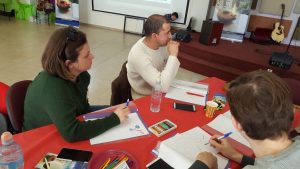“The sleeping fox catches no poultry” goes the proverb. This is just one of many proverbs that echo the bible. Time and again the Scriptures, both of the Hebrew bible and of the New Testament, call us to take initiative and to not remain passive. One of the most important biblical ideas is that fruit, or harvest, is the result of man’s interactive partnership with God, and not a sudden drop-down from heaven “by grace”. From Solomon, who saw poverty as the fruit of inaction (Prov. 6:10-11), to Yeshua’s teachings about forcefully advancing God’s kingdom (Matt. 11:12) and taking its yoke upon ourselves (Matt. 11:29), the call is the same: express your faith in the Creator by being creative! Step out, take action, do something!
Why am I writing about this? Because if it were not for the initiative of one teacher from a Bat Yam congregation, there would be no development in the children’s ministry in that congregation. This particular teacher, in conversation with Alec Goldberg (Israel Director of the Caspari Center), broached a matter that lay heavy on her heart: there are many children in the congregation, and although their Shabbat School teachers desire to serve these children to the best of their abilities, these teachers lack both knowledge and experience.
As our regular readers will know, the Caspari Center regularly holds seminars for Shabbat School teachers, where they can learn both the theoretical and practical aspects of working with children in a congregation. Unfortunately, Israeli reality dictates that not everyone is available to participate in our seminars, which are held on Fridays. Although Friday is a day off for most people, many congregations have meetings that day, while other people might need to work or study, making it impossible for some children’s ministry workers to participate in seminars.
We decided to try something new, and come to the aid of the teachers in this Bat Yam congregation by offering on-site training. As a pilot project, we conducted a weekly series of evening meetings in the congregational building to train the teachers, for a total of 5 weeks. I embarked upon this course enthusiastically as I routinely train new teachers in my congregation and am aware of the importance of this process.
I remember the first meeting with this group of teachers. Not many were present – only eight teachers – and they were already tired from a full day of work or study. But as they spoke about the children and about what they were hoping to achieve through the course, each one began to revive. I saw that their love for God and for the children gave them the strength to continue. Their incredible motivation struck me, and I realized just how much I wanted to help these people. They came to every meeting hungry to learn more, and carried out all their tasks with zeal.
and carried out all their tasks with zeal.
From the New Testament, we know that Paul and the disciples of Yeshua taught the believers intensively. For one year, Paul and Barnabas taught people in Antioch (Acts 11:26), and for three years, day and night, Paul taught the Ephesian presbyters (Acts 20:31). Of course, we are not Paul, nor could we reach this level in Bat Yam in only 5 meetings. But we do look to the early disciples as our role models.
I was pleased that my students immediately applied what they had learned in class, and then happily shared the positive results, some of them unexpected! When something is done regularly, a habit is formed. It’s what happened here, too. When, after the fifth meeting, I informed them that the course had come to completion, some of the teachers expressed their disappointment, that they had only just gotten a taste and weren’t ready for it to end. This is always a good sign. They enjoyed learning, which gives me hope that they will continue to learn on their own.
I am so happy that the Caspari Center was able to respond to the need of this congregation to train their teachers. We hope to offer this new kind of on-site training for other congregations’ teaching staff in the future.
Margarita Kantor, Project Coordinator